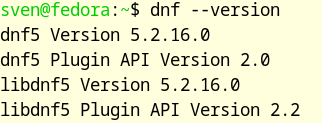Some important DNF-commands
Today about
- dnf info
- dnf search
This is a valid blog article for the Red-Family users and other distributions that uses the DNF tool for the package management. DNF stands for Dandified Yum, and it is the newer packager manager for the „old“ yum command. It was born on 11.05.2015. The current version is 5.2.17.0 that appeared on 02.09.2025.
On my current Fedora (41), I use the version 5.2.16.0.

dnf info
Search for information about a package, what you have installed.
Here is an example for the MySQL database:
dnf info mysql
Name : mysql
Epoch : 0
Version : 8.0.42
Release : 2.fc41
architecture : x86_64
download size : 2.4 MiB
installation size : 58.3 MiB
source : mysql8.0-8.0.42-2.fc41.src.rpm
repository : updates
resume : MySQL client programs and shared libraries
URL : http://www.mysql.com
licence : GPL-2.0-or-later AND LGPL-2.1-only AND BSL-1.0 AND BSD-2-Clause
description : MySQL is a multi-user, multi-threaded SQL database server. MySQL is a
: client/server implementation consisting of a server daemon (mysqld)
: and many different client programs and libraries. The base package
: contains the standard MySQL client programs and generic MySQL files.
Who offers it : Fedora Project
If you are not sure about the correct name
dnf info *mysql*
is possible, too
With
dnf search mysql
you search for a package name with the name mysql
Übereinstimmende Felder: name (exakt), summary
mysql.x86_64 MySQL client programs and shared libraries
Übereinstimmende Felder: name, summary
Io-language-mysql.x86_64 Io mysql bindings
MySQL-zrm.noarch MySQL backup manager
It is very useful when you want to install a package that name you do not know. The source comes from the installed repositories on your system.
Where are the repositories installed?
In most cases they are saved in /etc/yum.repos.d
You can check it with
ls /etc/yum.repos.d
It is a little extract of my installed repos:

Every repo has some information what is the name, where it contains their package information and other information.
Here is the repo of MongoDB – a database
